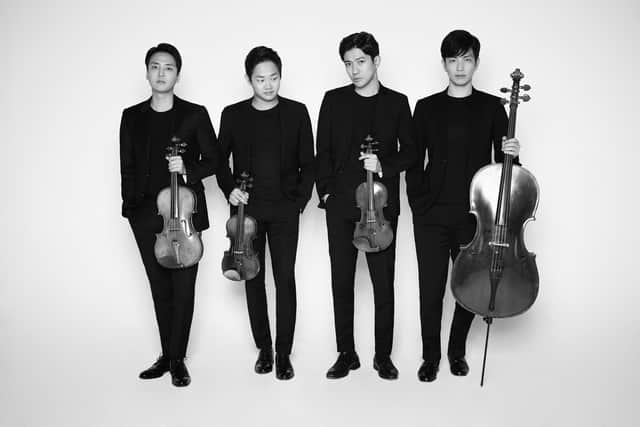Edinburgh International Festival music reviews: Cécile McLorin Salvant in Concert | Jupiter Ensemble | Novus String Quartet
Cécile McLorin Salvant in Concert *****
Usher Hall
Perhaps after the darker, folklore-informed overtones of her Ogresse show the previous night, Cécile McLorin Salvant was in more playful humour, though still giving free rein to that astonishingly pliant voice, switching and swooping between registers while articulating with total clarity.
Accompanied by a matchingly expressive quartet of piano, double bass, drums and congas, she drew affectionately from the film repertoires of Garland and Streisand, The Trolley Song, for instance, opening gently then building up a clamorous head of steam into full-throated holler, and when she tells you not to rain on her parade, boy does she mean it. A “Wizard of Oz meets Gregory Porter” introduction led to a powerful yet still plaintive Over the Rainbow.
Advertisement
Hide AdHer own compositions from her current Mélusine album included the skittish Francophone exuberance of Doudou (with a wonderfully melodramatic piano intro from Sullivan Fortner).
In contrast, the Rhiannon Giddens song Build a House was a bluesy, defiantly reproachful litany of injustice, while Pirate Jenny from Brecht-Weill’s Threepenny Opera could have just about made a show in itself, Salvant’s delivery shot through with sly menace, the black freighter lurking amid an ominously dramatic accompaniment.
Jim Gilchrist


Jupiter Ensemble ****
The Hub
As an introduction to a new type of classical concert experience for EIF audiences, the pairing of their refashioned home at The Hub with the energetic Jupiter Ensemble was a smart one, including for size and acoustic.
In terms of venue ambience, seats were soft and comfy, lighting was subtle and social media posting and popping out to bring back a drink from the bar were very definitely encouraged. While there is nothing wrong with drinks during a concert, there’s got to be a better way than coming and going in the quiet bits of the music.
What that music was - apart from pretty much total immersion in Vivaldi - and who the individuals were who performed it so brilliantly was not made known. However, obeying instruction to have a drink and meet the artists post-performance, Jupiter’s visionary director, lutenist Thomas Dunford, was only too pleased to explain their programme.
Two Vivaldi concertos – RV 82 in C and RV 93 in D - for lute, with Dunford himself as an enlightening soloist, framed instrumental movements from the same composer’s opera Ercole su’l Termodonte woven around other pieces for solo violin or cello, with especially striking playing from Swiss cellist Felix Knecht.
Advertisement
Hide AdIn relentless energy from all of Jupiter’s early music virtuosos, there could be no mistaking the chattering teeth in Winter from The Four Seasons, or the sultry heat of Summer. Few, however, would surely have known the rarer L’Olimpiade, a dramma per musica based on an Olympic Games love story.
No matter what they played, the ensemble was remarkable for its tight-knit and balanced flexibility, heard in what has fast become their own stylish and inimitable sound since formation in 2018. Smiles and eye contact abounded across the group in repertoire that they clearly love to perform.
Carol Main
Novus String Quartet ***
Queen’s Hall
Advertisement
Hide AdMaybe it was the unfamiliar venue and audience, or maybe the early hour. Maybe it was even intentional. But it took what felt like an age for the Seoul-based Novus Quartet to settle into their International Festival debut at the Queen’s Hall – right until the end of the second piece on their enjoyably wide-ranging programme, in fact. To the extent that, after the interval, it felt like we were hearing an entirely different ensemble.
The Novus’s dash though their opening Schubert Quartettsatz was pretty shrill, brittle, with a strangely unblended sound and flurries of notes hurried through as obstacles to be overcome rather than musical phrases with meaning and purpose.
It all continued in their Britten Second Quartet: its opening movement is fairly fragmentary at the best of times, but even more so when the intention seemed so clearly to get on to the next bit. And then in the piece’s serious-minded closing Chacony, everything changed: the pace dropped, and engagement went through the roof in a intense, deeply felt account.
It was a commitment that continued in the Novus’s closing Brahms A minor Quartet, Op. 51 No. 2, richly imagined and passionately argued, balancing the players individual voices and overall blend exquisitely. It was all a bit mystifying – but demonstrated beyond doubt that the foursome are nothing if not interesting.
David Kettle